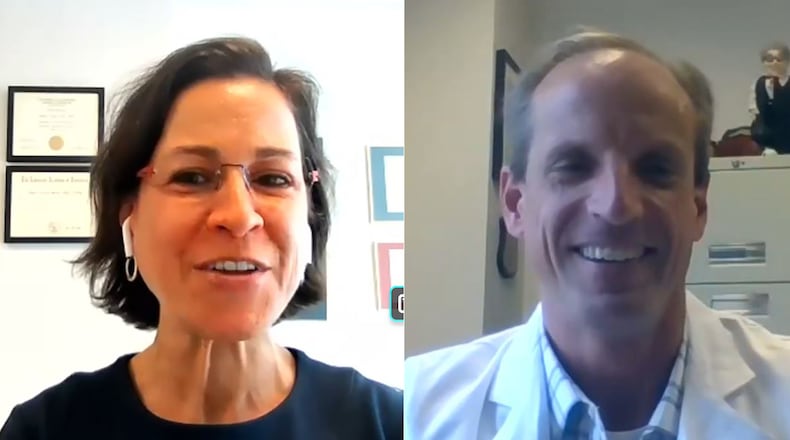Editor’s note: This story has been updated with additional information from the experts.
The U.S. Food and Drug Administration on Monday authorized Pfizer-BioNTech’s COVID-19 vaccine for use in children ages 12-15, and a Centers for Disease Control and Prevention panel signed off on Wednesday. That widens the pool of Georgians eligible for the coronavirus vaccine by about 6%, a critical advance.
It also presents parents with a potentially lifesaving choice.
In an online event Tuesday, two experts addressed questions parents might have. Dr. Andi Shane, chief of the division of pediatric infectious diseases at Emory University School of Medicine and medical director of infectious disease at Children’s Healthcare of Atlanta, and Dr. Evan Anderson, professor of medicine and pediatrics at Emory University School of Medicine and pediatric infectious diseases specialist at Children’s Healthcare of Atlanta, addressed the vaccine’s safety and benefits for children.
These are their answers, paraphrased and condensed. The moderator, Emory Department of Epidemiology Vice Chair Jodie Guest, also contributed facts about the setup of the adolescent vaccine trials.
Q: Do you have any safety concerns about the vaccine for children aged 12 to 15?
Credit: Screenshots taken by Ariel Hart / The Atlanta Journal-Constitution
Credit: Screenshots taken by Ariel Hart / The Atlanta Journal-Constitution
A: No. The vaccines have been used in many children, and we have data from that. The data came from a trial of 2,300 adolescents between the ages of 12 and 15, half of whom received the Pfizer vaccine.
Also, CDC data suggests that millions of doses of vaccine have been administered to 16- and 17-year-olds. CDC continues to take in reports on how vaccinees are doing following their shots. So far, all data looks reassuring.
Q: Children don’t often die from COVID-19. What are the risks to children if they don’t get vaccinated?
A: In the U.S., more than 300 children have died after contracting COVID-19. That’s more than the number who die in a bad flu season. Over 20% of all new cases of COVID-19 in the U.S. are occurring in children at this point in time.
There’s a syndrome known as MIS-C, or Multisystem Inflammatory Syndrome in Children, that we have seen in over 3,000 children in the United States. It occurs about three to four weeks after a COVID infection and sometimes after a COVID infection that’s not recognized. Many of these patients have required hospitalization and required care at varying levels in the hospital. We still are following very closely with cardiology colleagues and others to really understand the effects on the cardiovascular system.
It’s a very interesting virus. Some infected children have basically a mild, runny nose, some never know they were infected, and some require long periods of hospitalization. Unfortunately, some die. You just can’t predict what what your child will experience.
We’re also starting to see “long COVID,” or symptoms of fatigue; sometimes, respiratory challenges and muscle pain and just not being able to be themselves.
Q: Are there larger benefits—benefits to the child—of their getting vaccinated?
A: Yes. The unmeasured impact of this virus on development, on socialization and on behavior in children is tremendous. Vaccinating children will slow the spread of infection and help bring them closer to normal life.
Children can spread the virus. It is clear that kids can carry as much virus as adults do in their noses—a measure of how infectious to others you are. The older children seem to be perhaps a little bit better at transmitting virus than the younger children are, and yet it is a relative difference. Even the younger children can and do transmit the coronavirus.
Q: How important is it for children who’ve already recovered from COVID-19 to get vaccinated?
A: Very important. We don’t know how long immunity from natural infection lasts, especially in children, and the vaccine is the optimal way of providing protection.
Q: If a child has a severe peanut allergy, can they have this vaccination?
A: Yes.
Children who should NOT get the vaccine are those with an allergy to polyethylene glycol, to sorbitol or to mRNA vaccines in the past.
Q: Would you give this vaccine to your own children?
A: Yes.
Dr. Anderson: My two oldest kids will be getting their first vaccine dose within a few days of approval, and hopefully both doses of vaccine before they go to camp this summer.
Dr. Guest: My daughter was signed up the very first day a 16- and 17-year-old could get it in the state of Georgia.
About the Author
The Latest
Featured




